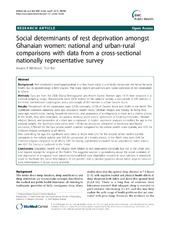| dc.description.abstract | Background: Rest deprivation (rest/napping/sleep 6 or less hours daily) is a clinically recognised risk factor for poor health, but its epidemiology is little studied. This study reports prevalence’s and social correlates of rest deprivation in Ghana. Methods: Data are from the 2008 Ghana Demographic and Health Survey. Women ages 15-49 were recruited in a national sampling design. Respondents were 4,916 women in the national sample, a sub-sample of 530 women in the three northernmost rural regions and a sub-sample of 853 women in urban Greater Accra. Results: Prevalence’s of rest deprivation were 0.13% nationally, 14.5% in Greater Accra and 16.8% in the North. The significant correlates nationally were age, education, wealth index, Christian religion and literacy. In Accra, they were age, wealth index, having household electricity, and possession of a refrigerator, a stove and a mobile phone. In the North, they were education, occupation, drinking water source, possession of motorcycle/scooter, Christian religion, literacy, and possession of a clock and a cupboard. In logistic regression analyses controlling for age in the national sample, the significant odds ratios were 1.40 for no education compared to secondary and higher education, 0.78-0.43 for the four poorer wealth quintiles compared to the richest wealth index quintile, and 0.55 for Christian religion compared to all others. Also controlling for age, the significant odds ratios in Accra were 2.15 for the second richest wealth quintile compared to the richest quintile and 0.16 for possession of a mobile phone. In the North they were 0.49 for Christian religion compared to all others, 1.87 for having a protected compared to an unprotected water source, and 0.41 for having a cupboard in the home. Conclusions: Education, wealth and religion were related to rest deprivation nationally but not in the urban and rural regions (except for religion in the North). This suggests caution in generalising about the social correlates of rest deprivation at a regional level, based on national-level data. Qualitative research in local contexts is needed in order to illuminate the social determinants of rest pattern, and to provide guidance about better ways to measure such determinants in future survey research. | en_US |

